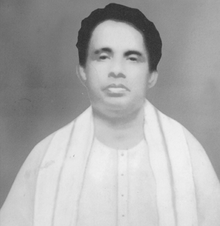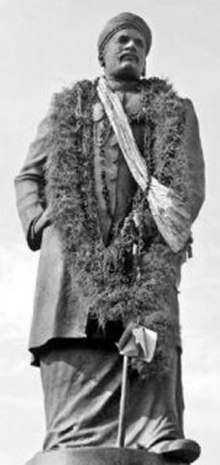Vagbhatananda
Vagbhatananda (1885 – October 1939) was a social reformer in British India. He was the founder of the Atmavidya Sangham, which was fundamentally a group of professionals and intellectuals who sought change, and also the Uralungal Labour Contract Co-operative Society.[1]
Vaghbhadananda | |
|---|---|
 | |
| Born | Vayaleri Kunhikkannan Gurukkal 1885 |
| Died | October 1939 |
Life
Vagbhatananda was born in 1885 near to Tellicherri in Kerala, India. He was given the name V. K. Gurukkal and was of the Thiyya community. He was educated in the traditional gurukkal system, through which he gained a proficiency in scriptures and philosophy. Following this, according to the historian K. K. N. Kurup, he travelled widely to propagate "the teachings of universal non-duality for a better and egalitarian society." His oratorical abilities led to him being given the name of Vagbhatananda by a swami named brahmananda sivayogi.[2]
At some time after 1898, Vagbhatananda founded a school teaching Sanskrit in Calicut, where he also took interest in the work of the Brahma Samaj that had been founded there that year by Ayyathan Gopalan.[2]
In 1920, Vagbhatananda founded the Atmavidya Sangham, whose principles he outlined in an Advaita treatise titled Atmavidya.[2] Unlike the Sree Narayana Dharma Paripalana (SNDP), which had been established by Narayana Guru and was significant around the same time, the Atmavidya Sangham comprised mostly professional and intellectual people and it had a more secular approach to reform.[3] It was instrumental in advancing the development of class organisation among peasants of the region, spreading Marxist–Leninist ideas as a counter to the overbearing feudal and religiously orthodox establishment. Vagbhatananda himself criticised both economic exploitation and the role of foreign governments in supporting it.[4]
Vagbhatananda, who was married, died in October 1939. Kurup has described him as a "good combination of an erudite scholar, reformer, organiser, journalist and nationalist. ... His authority was the ancient wisdom of Hinduism, not the dogmatism of theology." [5] The significance of the Atmavidya Sangham declined after his death, being superseded by other secular-oriented reform groups such as the Karshaka Sangham that adopted its agenda. However, it was still active in the 1980s.[3]
See also
References
Citations
- Shepherds' Chalet
- Kurup (1988), p. 94
- Kurup (1988), pp. 98-99
- Kurup (1988), p. 97
- Kurup (1988), pp. 94, 97
Bibliography
- Kurup, K. K. N. (1988), Modern Kerala: Studies in Social and Agrarian Relations, Mittal Publications, ISBN 9788170990949
- Shepherds' Chalet, Shepherds' Chalet, Shepherdschalet.com, retrieved 19 March 2014
Further reading
- Kurup, K. K. N. (September 1988). "Peasantry and the Anti-Imperialist Struggles in Kerala". Social Scientist. 16 (9): 35–45. JSTOR 3517171.
